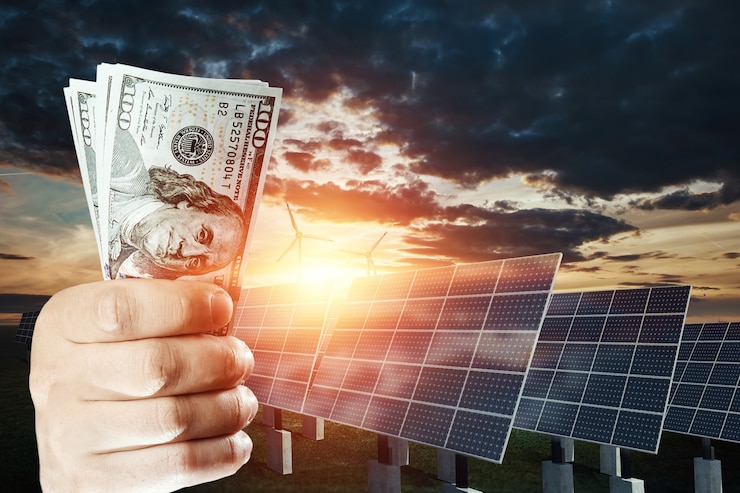What are commercial solar financing options?
A commercial solar energy system benefits businesses of all sizes, whether small, medium, or large. It slashes energy bills significantly, lowers tax obligations, and boosts property value. However, the crucial first step in achieving these benefits is choosing the appropriate solar financing options for commercial solar projects. After all, determining how to fund a large-scale project is essential to kick-starting its implementation.
Solar Financing Options Available

Cash:
Purchasing a commercial solar system outright with cash offers immediate ownership and access to federal and state solar incentives. This includes the Solar Investment Tax Credit (ITC), which lets companies get a tax break for some of the money they spend on solar panels. However, the main drawback is the significant upfront investment required, which may only be feasible for some businesses.
Loans:
Companies with good credit can obtain loans to finance their solar projects. Secured loans, requiring collateral, typically offer lower interest rates, while unsecured loans, without collateral, may have higher rates. Loans let businesses pay for their solar system over time, but they must consider the interest payments and how they might affect their credit scores.
PPAs (Power Purchase Agreements):
PPAs allow businesses to purchase solar energy from a system owner at a predetermined rate over a specified period, typically 10-15 years. This option requires little to no upfront investment and can provide immediate cost savings on electricity bills. However, businesses do not own the solar system, and savings may be less predictable due to fluctuating electricity rates.
Lease-to-Own:
Commercial solar leases involve leasing the solar project from a third party, with the option to purchase the system at the end of the lease term. This option requires minimal upfront costs and benefits businesses from immediate energy savings. However, companies do not directly benefit from tax incentives or depreciation.
C-PACE (Commercial Property Assessed Clean Energy):
C-PACE financing allows commercial property owners to finance energy upgrades, including solar installations, through a property tax assessment. This option offers long-term funding with payments based on property tax assessments. However, it may require approval from local governments and is limited to certain states.
Partnership Flips:
Tax equity investors partner with solar companies to finance renewable energy projects in a partnership flip arrangement. Investors own a majority stake in the project until their return rate is met, after which ownership is mainly transferred to the developer. This option provides access to upfront capital but requires careful negotiation and legal agreements.
Each financing option has advantages and considerations, so businesses should carefully evaluate their financial situation, goals, and long-term objectives before selecting the most suitable choice for their commercial solar project.
How Do Transaction Costs Affect Commercial Solar Financing?
Solar energy financing involves multiple parties with different objectives, making negotiation of legal terms complex and costly. Transaction costs rise significantly due to the involvement of various stakeholders. Consequently, such deals are more viable for larger projects surpassing a certain value threshold. While commonly used in the commercial and utility sectors, these financial structures often need to be more practical for smaller projects.
What Makes Commercial Solar Energy Systems Good Investments?
Solar projects provide numerous benefits for businesses, regardless of size or type.
Tax Benefits:
The federal solar investment tax credit (ITC) lets businesses get back about 26% of the costs they put into solar projects through their federal income taxes. Commercial solar projects pose fewer operating risks for their owners than tax shelters do. Over the past ten years, the ITC has been a big part of getting businesses to switch to solar energy by giving them an easy way to lower their taxed income.
Operational Benefits:
Solar project investments offer more than just tax benefits. Installing a solar energy system allows commercial entities to enjoy stable electricity rates for many years, leading to significant operational savings. Solar energy also enhances reliability, reducing the risk of frequent power outages and minimizing downtime when combined with battery storage. Additionally, solar panels can raise a home’s value without changing how it’s built.
Environmental, Social, and Governance Goals:
Businesses can meet their environmental, social, and governance (ESG) goals by going solar. Solar power is a practical way to achieve sustainability goals because it’s a tangible and measurable source of green energy. Solar-powered systems are relatively easy to implement and integrate seamlessly into everyday business operations.
Solar Earth For C&I Solar Projects
Commercial solar financing can feel complicated and overwhelming. But don’t worry, you don’t have to be an expert to understand it. Knowing the different options, their advantages, disadvantages, and what they mean for your company is essential.
If you want to find the best solar financing options for your company’s goals, contact Solar Earth Inc. Our team of experts has extensive experience in solar, energy management, and construction. We’ll assist with installation and guide you through the options.
